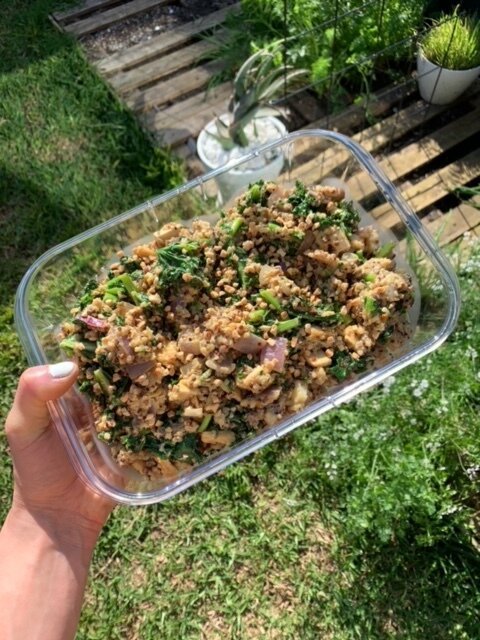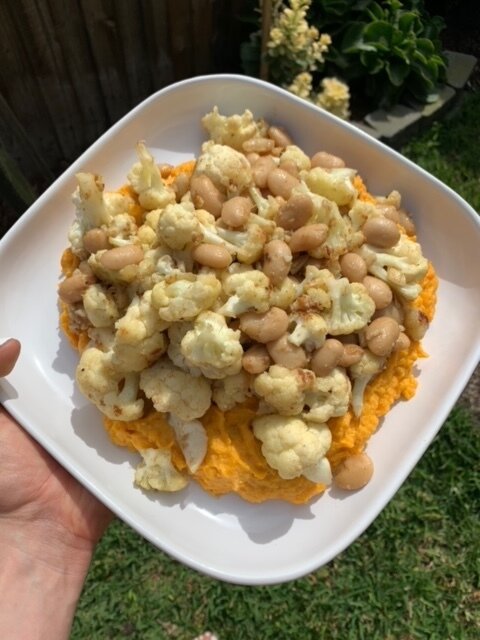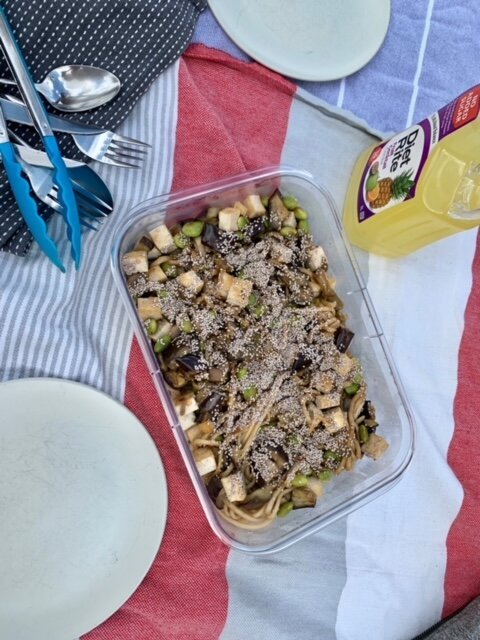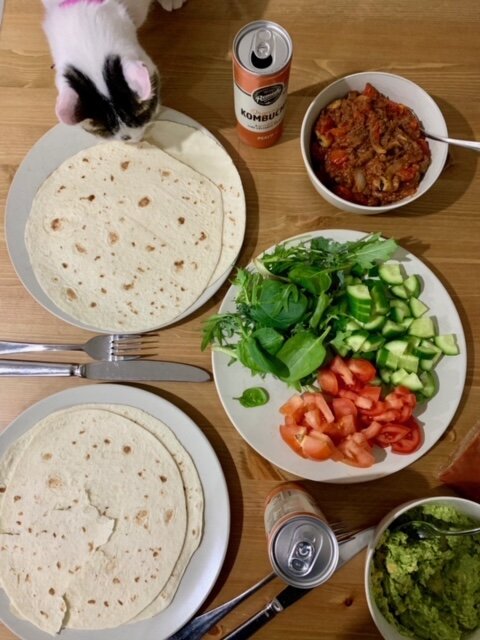10 Things I've Learned In Five Years Of Vegetarianism
It’s five years this month since I started removing meat from my diet. Mind blowing to me. I do get asked a lot about my diet — how to go about cooking, socialising, training, getting enough protein, supplementing, etc. They are all great and important questions. In this article, I’ll go through some of the most valuable things I’ve learned in the last five years, relating to training, performance, body composition, health, creating change and not burdening everyone around you with god-forbid your ethics.
So without stuffing about too much, here are the 10 most valuable lessons I’ve learned in five years of vegetarianism.
1. If you’re a vegetarian of bad health, you’re doing nothing to promote change. Be a good role model.
This is something I recognised very early on. If as a plant-based eater, I’m healthy, my immunity is strong, my energy levels are good and consistent, my training goes well, my strength improves, I can build muscle and recover well, it casts a vote in the mind of others that you can be fit, strong and healthy as a plant-based eater. Alternatively, if all of the above is trash — my health is garbage, I’m repeatedly unwell, I’m always tired, my training is low quality, I’m weak and don’t recover well, I’m hardly an affirmative vote for eating less meat.
That said then, if you really want to make a positive change for the environment and/or animal welfare, you’d do well to make your health a high priority.
If for you to be in perfect health means supplementation, eating eggs or dairy products on occasion, even eating animal products sporadically, you’re not a bad person and you haven’t failed.
I think it is really important to say that if you eating animal products once every week/fortnight/month means that you are able to sustain the diet long term, maintain good health and influence someone else to adopt a more plant-based diet, it could be that your 1x meal with animal products every X time period creates a flow on effect of someone else eating 10x less meat meals every X time period. The net outcome is less meat consumption and more positive. Again, you’re not a bad person and you haven’t failed. Rather, you’ve cast a vote for the planet/the animals over your own ego. Good for you.
We don't need a handful of people doing plant based perfectly; we need billions of people doing it imperfectly.
So, with or without any animal products, if you want to create long lasting change, you need to care for your health. Don’t let it be an afterthought. Health needs to be a priority from day one. Get read up on common deficiencies, ensure your diet is well-rounded, supplement when needed, get regular blood tests (especially early on) and be cognisant of any changes in your health or mood. The alternative? Feeling like trash, confirming beliefs that vegetarians always feel like trash, having your doctor and all of your loved ones in your ear to eat meat again, and possibly getting back there. Be proactive.
2. Your energy levels will suck if you don’t actively manage your micro-nutrition.
Whenever we exclude a food group, we run the risk of missing out on certain nutrients. As healthy as a plant-based diet can be, a well-rounded plant-based diet doesn’t happen by accident. The deficiencies most common in plant-based eaters are iron and vitamin B12, with the most frequently reported symptom low energy levels. You do need to be proactive in order to get sufficient micronutrients in your diet and you will run in to trouble or just really shitty energy levels if you live off bread, potatoes, pasta and a piece of fruit every couple of days. Eat a variety of foods from a variety of food groups, check your bloods on a regular basis and supplement as needed. Again, you’re a shitty role model if your energy levels suck and well, your health is important. I’ll leave that there now.
3. It’s not that hard to get adequate protein, but it won’t happen by accident.
A major concern for many of the people around me is the ability to obtain adequate protein from a completely plant-based diet, particularly as a lifter/athlete. I won’t dance around this — getting protein is a bit more of an effort if you’re not eating meat, dairy or eggs. But it’s far from impossible. It does require more effort and planning, but if you’re willing to do a little research and devote a little more time to planning your days, you’ll find it’s really not that bad or tedious.
I do somewhat humbly think this article is brilliant and contains a bunch of hacks for getting protein in pretty easily. Again, it won’t happen by accident but it’s also not that hard when you know what you’re doing.
4. Processed foods aren’t bad for you.
Again many people (perhaps slightly ignorantly) glorify and/or adopt a plant based diet under the impression that it is the most healthy diet. Oftentimes when someone adopts a plant based diet for health reasons, they remove many if not all processed foods from their diet at the same time. The diet that is ultimately pursued is an exclusively whole foods diet, consisting of almost entirely vegetables, fruits, grains, seeds and nuts. Each of these foods on their own have many health benefits, but in isolation as a complete diet, are immensely lacking. There is so much not present.
The internet loves to demonise processed food. Let’s be clear that there is nothing wrong with processed food. Processed foods (and probably most relevant to this conversation, meat substitutes and protein-enriched foods) can make life so much easier, yield plenty of protein for minimal effort and by virtue of less effort for same nutritional return, can permit more time to focus on other elements of your wellbeing.
In the absence of meat substitutes, protein powders, protein-enriched milks and high protein breads, god damn I would either:
- have sweet fuck all protein in my diet or
- spend 16 hours per day cooking 200+ ingredient whole food only meals that contain so much fibre that I spend the remaining eight hours on the shitter.
Know what’s less healthy than processed foods? A protein deficient diet, a micronutrient deficient diet, spending so much time planning your meals that your social life, career, studies, family, sport and mental wellbeing suffer as a result. They’re not the devil and almost certainly will benefit the well-roundedness of your diet, your overall quality of life and wellbeing immensely.
5. Plant based is not synonymous with healthy / organic / low fat / weight loss. You can eat a plant based diet and be unhealthy and you can eat a plant based diet and gain weight.
Following on from my last point, I really feel this needs to be said. A plant based diet is not necessarily more healthy. Excluding an entire food group is rarely health-promoting.
A small amount of animal products in many cases is probably more healthy than excluding them all together.
A vegetarian diet can and is often used as a reason to exclude a food group for those with disordered eating habits.
You can still eat in a calorie surplus and gain weight on a plant-based diet — bread, cake, pasta, crisps, coke, bagels, cocktails, wine, etc can and often are plant based. To be clear, none of these foods are “bad” but they can certainly be calorie dense.
I think the point I most want to make here is that while I want to encourage the whole world to eat less meat, eating no meat at all for health reasons is probably misguided. You can achieve great health with no meat in your diet, but it’s probably not the best way to go about it. It is important that you know this.
6. You’ll need to learn how to cook all over again. It is important that you do.
I grew up with a British Mum. For the first ~20 years of my life, every meal I had followed the structure of meat + three veg. In the absence of meat, you can see how that meal structure would get pretty boring and pretty inadequate, pretty quickly. If you’re going to exclude meat, you need to reinvent the way you approach cooking and get way more creative. It doesn’t need to be hard, but it does need to be deliberate. My best advice, just start with some Google searches. EG,
Weeknight vegetarian meals
Vegetarian meals for non vegetarians
Vegetarian “insert favourite meal name here.” EG, vegetarian bolognaise
For some inspo, I’ve listed recipes for some of my regular meals over at this article. I frequent Mexican foods, curries, pastas, soups, salads, pizzas + admittedly, meat and three veg with fake meat bc #comfort
7. Want to change something? Lead with your why.
Five years on, the smell of a sausage sizzle still sends my senses in to a mania but I can hand on my heart say it will never smell good enough for me to slap one on a slice of bread. Similarly, there are social situations, cultural experiences, etc that could/would be enhanced by eating meat, be it going to Bunnings on a Sunday morning, Christmas lunch with my family or eating fresh seafood on the coast of Croatia. In none of these situations am I tempted. Not because I possess a will stronger than all others but simply because my “why” for plant-based eating is so strong.
If the future of the planet is something that concerns you deeply or animal welfare is a cause immensely close to your hearty, lean in to that. If you can mindfully make decisions that align with your value system, eating tofu when your friends eat steak becomes a surprisingly easy decision.
8. In the pursuit of behaviour change, lead with your identity. “I am a vegetarian” is heard more loudly than “I’m trying to eat less meat.”
When I first tried to stop eating meat, I would tell people “I’m trying to eat less meat.” This really opens the door for “well you can eat meat tonight then because I’m cooking and it’s my house and you can eat less meat later.” Conversely, when you communicate that you don’t in fact eat meat, you will be more accommodated and it will be much less likely that you’ll need to fight off any peer pressure to conform to the dominant eating habits of the group you’re surrounded by.
Hot tip: this also applies for things like drinking. “I don’t drink alcohol” is heard much more clearly than “I’m not drinking tonight” or “I’m trying to drink less.”
9. Your parents and friends might think you’re difficult but if they care for you, they’ll come around.
From ages 15-19 my eating habits were largely disordered. I was awful to cook for. From 19-23 I tracked my macros meticulously and followed a strict bro diet. Again, awful to cook for. So when at 23 I finally closed the books on my disordered eating habits and my Mum was finally like “halle-fucking-lujah, we can finally share a meal when Billie comes home”, she was naturally a little disgruntled when I announced that I wouldn’t eat meat anymore. Feeding me was so deep in the too hard basket. Buuuut, not too long in, she became extremely accomodating and expanded her skill set to include a heap of delicious plant-based recipes. Stuffed pumpkin at Christmas was a highlight.
I fondly remember dinner after the 2019 Powerlifting Summit at JPS Health + Fitness. Co-owner of JPS, Sam contacted me about the restaurant he had in mind before booking to ensure I’d be able to eat there.
Whenever we have board game night with our neighbours, we order from the same Indian restaurant that is completely vegetarian. They love the restaurant as much as I do. Everyone eats meat-free on board game night and everyone enjoys it.
My friends let me choose brunch venues just about 100% of the time so I can find somewhere appropriate to eat. I can always be trusted to find a place with epic vibes and ambience which they’ve learned over time.
This probably makes me sound like a little diva but more to the point is that my friends and family respect my choices and preferences and we interact in such a way that it isn’t a giant burden on them to accomodate me. Your friends and family will likely be the same, if not immediately then eventually.
You don’t need to miss out on social occasions and you don’t need to inconvenience everyone around you. Your values and preferences matter and ought to be respected. And again, if not immediately but eventually, your loved ones will learn to navigate them in a way that doesn’t make them feel like you are a hugely annoying inconvenience.
10. When you stop eating meat, your compassion for every living thing grows.
I left this until last bc it’s cheesy and if it were early you wouldn’t have stayed.I mostly including this to see if I get any “omg I feel this too” responses. The biggest indicator of this for me is how petrified I used to be of spiders and bugs and how I am absolutely not fearful of them now. A spider in my bedroom is now greeted with a “Hi little fella, you lost? Let me help you get back home” and a gentle capture and release in to the garden — where once upon a time I would have sprinted out of the room and refused to enter until I saw his dead body.
But also, I am absolutely hopeless at growing a veggie garden because I see snails or really any kind of insect in there and I’m like “oh god, who am I to deprive you of the delicious spinach? Eat up little guy. I didn’t want it anyway.”
Since adopting a completely plant based diet, I feel everything related to animals so much more deeply. I cry in every documentary about saving the planet, I want to cuddle every damn horse/llama/pup/deer/kitty/goat I see and I hold my own petties so immensely closely. It’s a classic case of “it’s both a blessing and a curse to feel everything so deeply” but I think overall, switching to a plant-based diet has been immensely life-enriching.
No I don’t miss bacon, I still make gains, I share meals with my loved ones and I feel brilliant.
Inbox is always open + I’m always happy to chat.
Billie x





